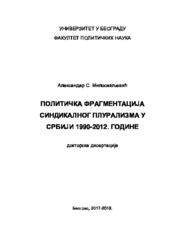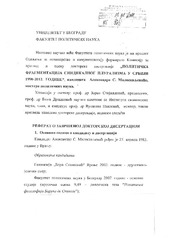Приказ основних података о дисертацији
Политичка фрагментација синдикалног плурализма у Србији 1990-2012. године
Political fragmentation of union pluralism in Serbia from 1990 to 2012
| dc.contributor.advisor | Pavlović, Vukašin | |
| dc.contributor.other | Stojiljković, Zoran | |
| dc.contributor.other | Drašković, Boža | |
| dc.creator | Милосављевић, Александар С. | |
| dc.date.accessioned | 2018-09-06T08:41:16Z | |
| dc.date.available | 2018-09-06T08:41:16Z | |
| dc.date.available | 2020-07-03T09:39:50Z | |
| dc.date.issued | 2018-06-25 | |
| dc.identifier.uri | https://nardus.mpn.gov.rs/handle/123456789/9787 | |
| dc.identifier.uri | http://eteze.bg.ac.rs/application/showtheses?thesesId=5933 | |
| dc.identifier.uri | https://fedorabg.bg.ac.rs/fedora/get/o:18078/bdef:Content/download | |
| dc.identifier.uri | http://vbs.rs/scripts/cobiss?command=DISPLAY&base=70036&RID=50358287 | |
| dc.description.abstract | Рад се у основи бави феноменом политичке фрагментације синдикалног плурализма у Србији уз посредовање експланаторне варијабле политичког идентитета најважнијих синдикалних конфедерација која се анализира из угла њених историјских корена. Претходећи, теоријски део рада у коме се тематизира однос синдиката и политичког система, има функцију прибављања неопходне теоријске оправданости истраживања, као и увођења у истраживачки проблем. Овај део је значајан јер указује на потребу разумевања саме суштине политичке функције савремених синдиката путем које они постају актери политичког процеса. Посматрана у одговарајућој временској перспективи, њене актуелне перформансе могу се једино на прави начин разумети једноставним увидом у формативни период развоја синдиката. Полазну основу рада представља детекција политичке немоћи синдиката у Србији која се манифестује у њиховим релацијама са државом, политичким партијама, приликом усвајања радног законодавства, спровођења процеса својинске трансформације, социјалног дијалога. Као једно од могућих објашњења кандидује се управо политичка фрагментација синдикалног плурализма. Аргументација се, стога, креће у правцу указивања на то да она негативно утиче на процесе дугорочног обједињавања синдикалних ресурса и остваривање заједничког и стратешки важног политичког утицаја. Политичка фрагментација синдикалног плурализма Србије је последица постојања дивергентних политичких идентитета три синдикалне конфедерације (Савеза самосталних синдиката Србије, УГС „Независност“, Асоцијације слободних и независних синдиката). Политички идентитети синдикалних конфедерација су значајна еспланаторна варијабла јер детерминишу њихову политичку функцију и представљају наслеђе дводеценијског развоја синдикалног плурализма у Србији. При томе, треба правити разлику између формативног периода (1990-е године) и фазе њихове репродукције (од 2001. па надаље). Сумарно, овај истраживачки подухват подразумева дефинисање: 1) синдиката као политичко-економског актера и историјског аспекта развоја њихове политичке функције; 2) политичке немоћи као важне неуралгичне тачке синдикалног плурализма у Србији; 3) политичке фрагментације синдикалног плурализма и њених индикатора; 4) политичког идентитета синдиката синтезом његове нормативне и практичне димензије; 5) кључних елемената контекста њихове продукције и репродукције (политичко-институционални дизајн, тип партијског система и односи са актерима политике, политизација, кључне теме изборних кампања), као и наслеђа. | sr |
| dc.description.abstract | The paper deals essentially with the phenomenon of political fragmentation of union pluralism in Serbia, with the intermediation of the explanatory variable of the political identity of the most important union confederations, which is analyzed from the angle of its historical roots. The previous,theoretical part of the paper in which the relationship between the union and the political system is discussed, has the function of obtaining the necessary theoretical justification of the research, as well as the introduction into the research problem. This part is significant because it points to the need of understanding the very essence of the political function of modern unions through which they become the actors of the political process. Observed in the appropriate temporal perspective, its actual performances can only be understood in the right way by a simple insight into the formative period of union development. This work's starting point is the detection of the political powerlessness of the unions in Serbia, which manifests itself in their relations with the state, political parties, in the adoption of labor legislation, the implementation of the process of ownership transformation, social dialogue. One of the possible explanations for this is the political fragmentation of union pluralism. Argumentation, therefore, moves in the direction of indicating that it negatively influences the processes of long-term merging of union resources and the achievement of a common and strategically important political influence. The political fragmentation of union pluralism in Serbia is a consequence of the existence of divergent political identities of the three union confederations (Confederation of autonomous trade unions of Serbia, the United branch unions "Nezavisnost", the Association of Free and Independent Unions). Political identities of trade union confederations are significant esplanatory variables because they determine their political function and represent the legacy of the two-decade long development of trade union pluralism in Serbia. In doing so, a distinction should be made between the formative period (1990) and the stage of their reproduction (from 2001 onwards). In summary, this research undertaking implies the defining of: 1) trade unions as a political-economic actor and a historical aspect of the development of their political function; 2) political weakness as important neuralgic point of union pluralism in Serbia; 3) political fragmentation of trade union pluralism and its indicators; 4) the political identity of the union through the synthesis of its normative and practical dimension; 5) the key elements of the context of their production and reproduction (political-institutional design, type of party system and relations with policy actors, politicization, key themes of election campaigns), as well as heritage. | en |
| dc.format | application/pdf | |
| dc.language | sr | |
| dc.publisher | Универзитет у Београду, Факултет политичких наука | sr |
| dc.rights | openAccess | en |
| dc.rights.uri | https://creativecommons.org/licenses/by-nc/4.0/ | |
| dc.source | Универзитет у Београду | sr |
| dc.subject | синдикати | sr |
| dc.subject | Trade unions | en |
| dc.subject | political system | en |
| dc.subject | political function of trade unions | en |
| dc.subject | political identity of trade unions | en |
| dc.subject | historical institutionalism | en |
| dc.subject | fragmentation of union pluralism | en |
| dc.subject | политички систем | sr |
| dc.subject | политичка функција синдиката | sr |
| dc.subject | политички идентитет синдиката | sr |
| dc.subject | историјски институционализам | sr |
| dc.subject | фрагментација синдикалног плурализма | sr |
| dc.title | Политичка фрагментација синдикалног плурализма у Србији 1990-2012. године | sr |
| dc.title.alternative | Political fragmentation of union pluralism in Serbia from 1990 to 2012 | en |
| dc.type | doctoralThesis | en |
| dc.rights.license | BY-NC | |
| dcterms.abstract | Павловић, Вукашин; Драшковић, Божа; Стојиљковић, Зоран; Milosavljević, Aleksandar S.; Politička fragmentacija sindikalnog pluralizma u Srbiji 1990-2012. godine; | |
| dc.identifier.fulltext | http://nardus.mpn.gov.rs/bitstream/id/22344/Disertacija.pdf | |
| dc.identifier.fulltext | https://nardus.mpn.gov.rs/bitstream/id/22344/Disertacija.pdf | |
| dc.identifier.fulltext | https://nardus.mpn.gov.rs/bitstream/id/22345/IzvestajKomisije17463.pdf | |
| dc.identifier.fulltext | http://nardus.mpn.gov.rs/bitstream/id/22345/IzvestajKomisije17463.pdf | |
| dc.identifier.rcub | https://hdl.handle.net/21.15107/rcub_nardus_9787 |



